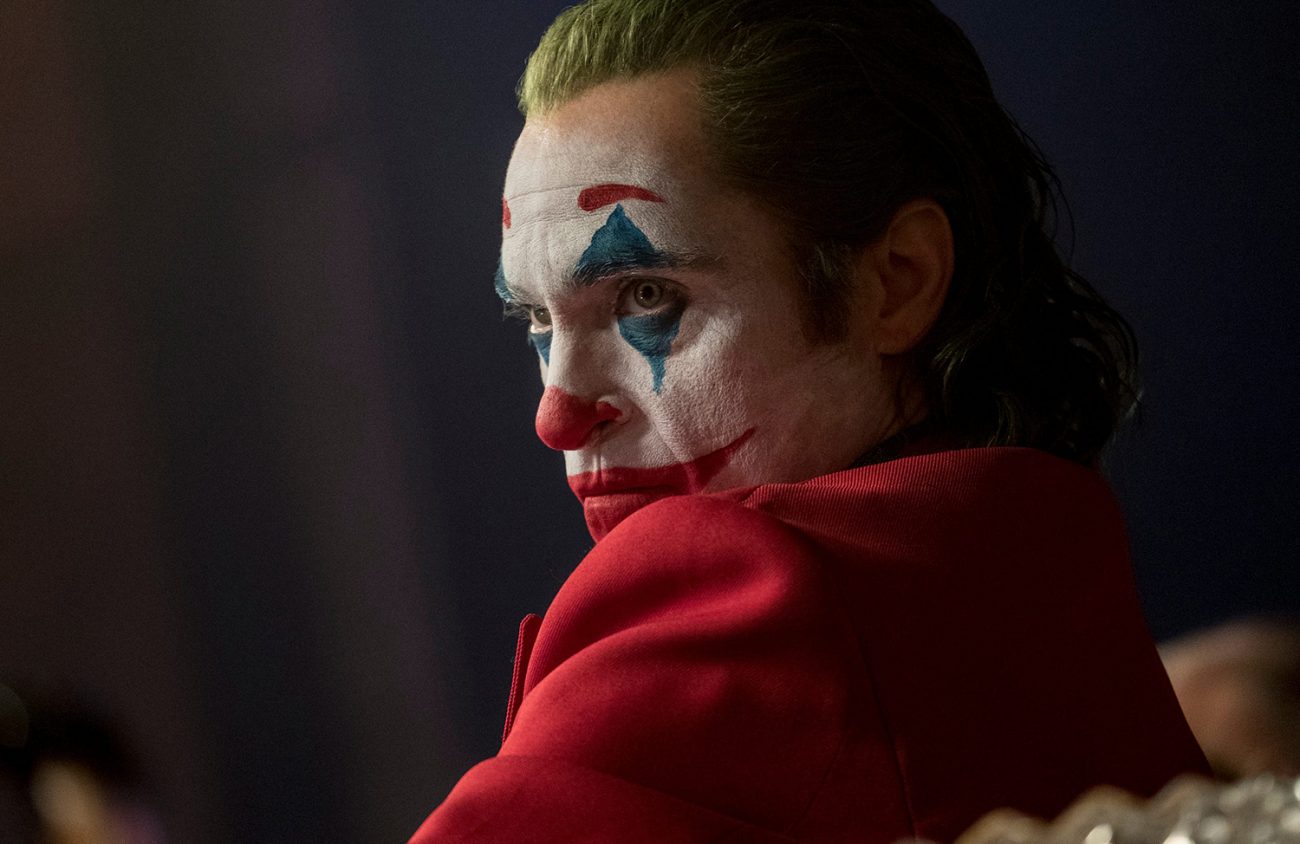It’s a mess out there, Arthur Fleck (Joaquin Phoenix) tells his social worker at the start of Joker. She agrees, saying there’s a lot of tension.
People are just trying to get by in Gotham City. Businesses are closing, unions are fighting for fair wages and many live in squalor. The rich are doing fine, though, and the haves can push others around to get their way. As indicated by the title of Zorro, The Gay Blade (1981) on a movie theater marquee, the country is suffering from Reaganism — a trickle-down condition every president since has dealt with in one way or another.
Fleck is a have-not. He’s suffering from mental illness and takes several medications to keep from harming himself and others. A struggling clown but aspiring stand-up comedian, he lives with his mother (Frances Conroy), who adores Gotham City billionaire Thomas Wayne (Batman’s father, played by Brett Cullen) and wants Wayne to run for mayor because he can fix the city’s plague of poverty and crime.
Fleck is trying to be the funnyman, but the joke’s always on him.
As a clown dancing with a “going out of business” sign, he gets beaten up by a group of teens. When he’s riding the subway home after getting fired for bringing a gun to a children’s hospital, he gets assaulted by three Wall Street types who were harassing an attractive woman: Fleck kills all three of them, sparking an “anti-rich” sentiment in the city.
Then Fleck’s stand-up act gets made fun of by a talk show host he admires.
To make it all worse, he loses access to whatever minimal support he receives as the city institutes austerity measures. That serves as a reminder that the powers-that-be don’t care about the people on the bottom, his social worker tells him.
Phoenix’s Joker is a villain who, in later stories, goes on to terrorize Gotham City and Batman — even killing one of his Robins in the comic book series A Death in the Family. Despite the connection to comic books, Joker doesn’t have the qualities of those Marvel monstrosities.
Directed and co-written by Todd Phillips (Old School, the Hangover series and Borat), Joker looks more like Martin Scorsese’s Taxi Driver than Christopher Nolan’s Dark Knight trilogy — which is no coincidence, considering Robert De Niro’s casting in Joker as the late-night show host Murray Franklin.
In telling the story of one of the most successful Batman villains ever, Phoenix has a lot to prove and an ocean of shadows to overcome. Phoenix stands his ground and avoids a fate like Jared Leto’s disastrous performance as the villain in Suicide Squad.
Phoenix told The New York Times that he lost 52 pounds at the request of Phillips. That preparation — the sort of stuff Oscars are made of — created a scrawny, unhealthy Fleck. When Phoenix twists and dances in underwear (which happens a lot) as he transforms into the “Clown Prince of Crime,” his bony protruding skeletal body sticks out on the big screen.
Phoenix inspires uneasiness in the viewer as he suffers from uncontrollable laughter in public. He summons pity in his love/hate relationship with his mother, and he makes you want to cover your eyes in anxiety when he attempts stand-up comedy.
Sure, De Niro is in on the joke as a late-night host whom Fleck adores as a father-like figure, but Phoenix’s performance eclipses the rest of the cast. From the opening scene — an extreme close angle of Phoenix contorting his face into a smile with his fingers, forcing tears in his eyes to the final laughs — this movie belongs to him.
Just as the late Heath Ledger’s portrayal of Joker in The Dark Knight represented an era when the U.S. was dealing with the anxieties of 9/11 (Batman uses a surveillance system in that film which makes Eugene Police Department’s surveillance trailers look like toys), Phoenix’s Joker tells the story of the U.S. economic and political environment today.
Fleck’s mother has delusional hope in a rich man’s ability to change the city for the better — although this faith is often held by millions of Americans who cast their ballots every other year. And Gotham City’s elite and media outlets seem more distraught over the death of rich white guys than the everyday poor, as Fleck observes at one point.
Yet the Joker doesn’t have “anti-wealth” sentiments, because he doesn’t have an ideology. Rather, to quote Batman’s butler, Alfred, in The Dark Knight: “Some men just want to watch the world burn.”
